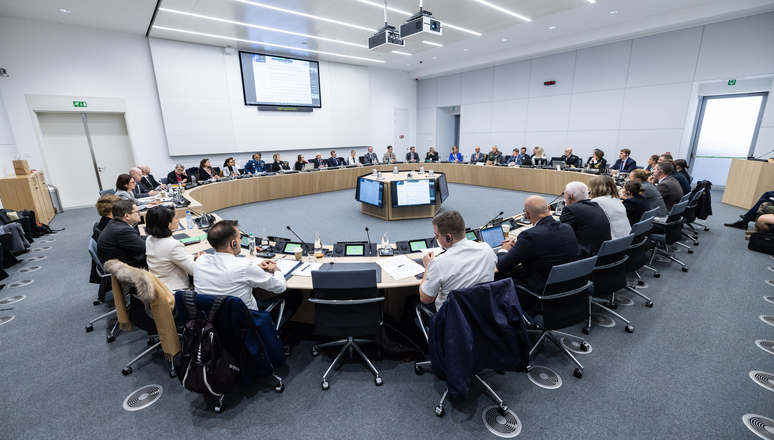NATO Environmental Protection Working Group celebrates its 25th meeting
From 9 to 11 November 2022, the NATO Environmental Protection Working Group (EPWG) held its plenary meeting at the NATO Headquarters in Brussels. The plenary centred on the hybrid event marking the 25th meeting of the EPWG, highlighting NATO’s continued stake in environmental protection and its cross-cutting dimension.

The centrepiece of this year’s EPWG plenary was the hybrid event held to commemorate the 25th meeting. The celebration brought together interested staff, subject matter experts and stakeholders in environmental protection, climate change, energy security and emerging security challenges from both Allied and Partner countries. Opening the event, the Director of the NATO Standardization Office, Major General Dimitrios Sigoulakis emphasised the value of the EPWG in setting standards for environmental protection in NATO military activities and in providing support and expertise to Alliance-wide innovation. He underlined, “standardization and interoperability remain cornerstones of the co-operation within our Alliance. At the same time, we see that innovation has become of utmost importance to remain relevant”.
In his congratulatory remarks, Deputy Assistant Secretary General for Emerging Security Challenges, Mr James Appathurai, commended the working group for their continued support. “The implications of climate change such as floods, droughts, disruption to access to resources, loss of land and livelihood, more extreme weather events and other deteriorating environmental conditions have been clearly identified as threat multiplying factors for instability, conflict and terrorism. We must adapt to the impact of climate change on security and try to reduce our greenhouse gas emissions. Working with the EPWG allows my division to have access to better and more specialised expertise in that domain, and we are grateful for the fruitful collaboration”, he noted.
The commemorative event continued with briefings and discussions on the synergies between environmental protection and its associate fields, such as security and climate change mitigation, and the contributions to energy security and carbon-neutral energy supplies, especially important in the current security context following Russia’s illegal invasion of Ukraine.
Coinciding with the 2022 United Nations Climate Change Conference, the EPWG provided a unique platform to discuss the benefits of increasing the coordination and cooperation between the environmental protection, energy security and climate change fields. The Chair of the EPWG, Mr Jeroen Rottink noted “environmental protection is a cross-cutting domain in support of many areas. By increasing our exchanges of expertise and identifying more synergies, the EPWG can contribute significantly to improving energy security and mitigating the effects of climate change. This is especially important due to the current geopolitical situation and the earth’s rapidly changing climate”.
The rest of the programme was divided in plenary sessions, which focussed on the integration of environmental protection into procurement and defence planning, and potential synergies with climate change mitigation and energy security. Participants also received updates from NATO’s Strategic Commands, Allied Command Operations and Allied Command Transformation, on their respective activities in the field of environmental protection.
The EPWG took the opportunity and recognised the Senior NATO Science for Peace and Security (SPS) Programme and Partnership Cooperation Advisor, Dr. Deniz Beten-Yüksel for her invaluable contributions to environmental protection within the framework of cooperation with Partners.
As early as 1969, NATO recognized environmental challenges by establishing the Committee on the Challenges of Modern Society (CCMS). This work led to the establishment of the EPWG in 1999. Today, the EPWG is subordinated to the Military Committee Joint Standardization Board and supported by the NATO Standardization Office. The EPWG develops standards to reduce the environmental footprint of armed forces, while maintaining operational effectiveness and readiness. It provides a platform to share expertise among Allied and Partner Nations.
